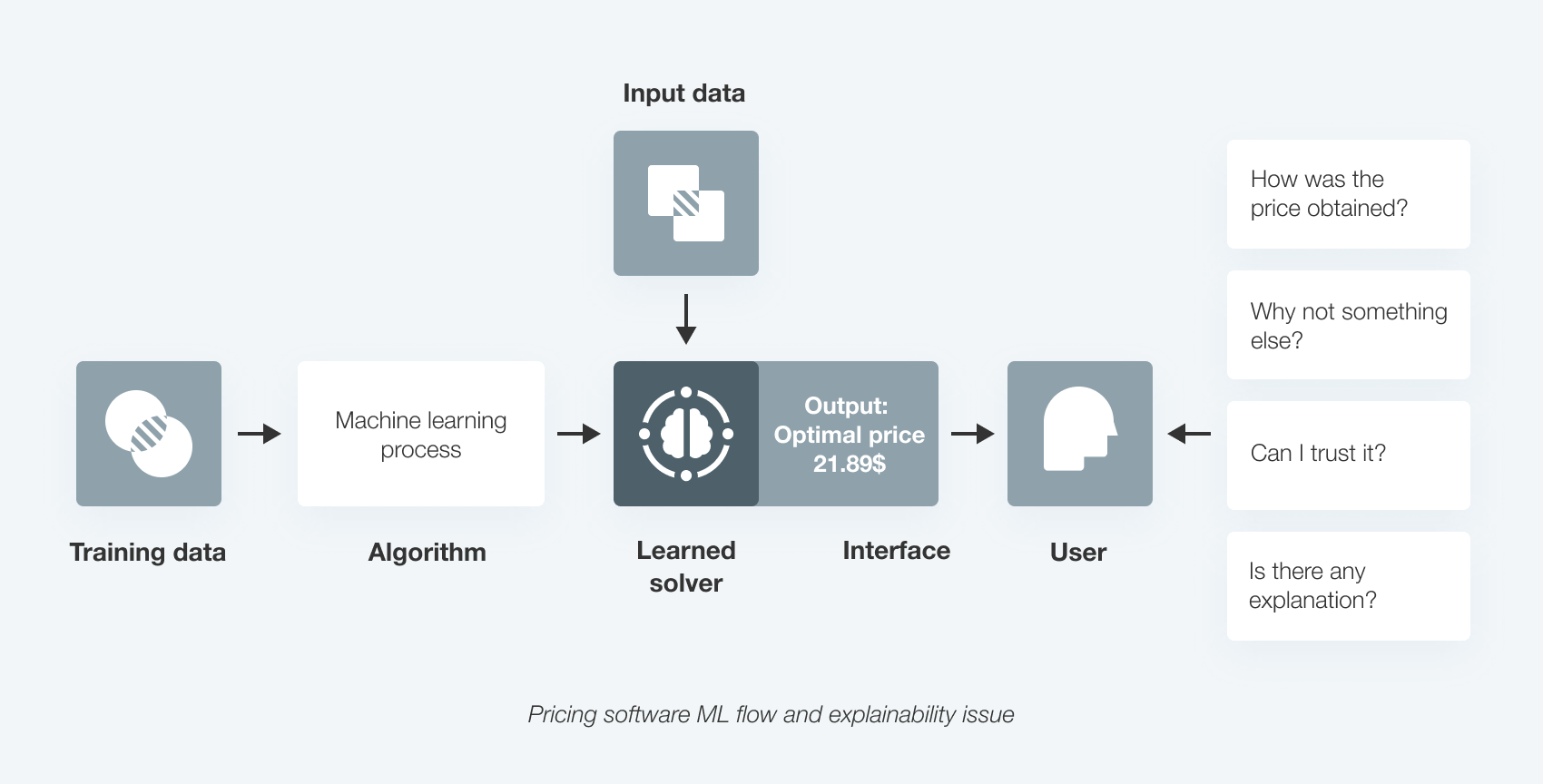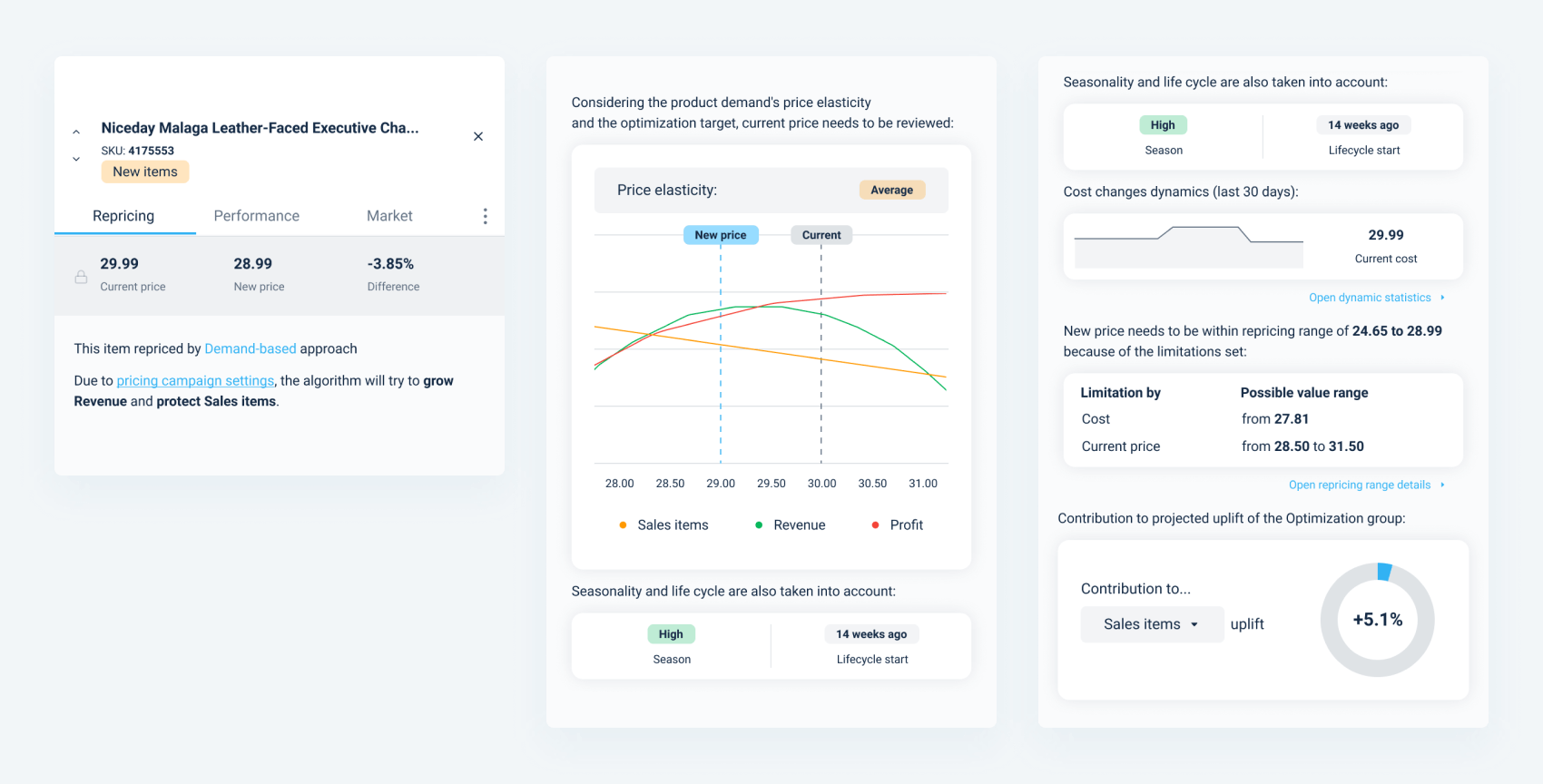Content navigation:
- AI in retail use cases
- Automated inventory management
- How AI in retailing is used today
- The impact of artificial intelligence in retail
- AI in pricing: a use case
The application of artificial intelligence in retail is reshaping various facets of the industry, including demand forecasting, optimal pricing, customer experience enhancement, and inventory and supply chain management enhancement. Total spendings on artificial intelligence (AI) in the retail industry are expected to reach the point of $29.45 billion by 2028. This trend illustrates the mainstream adoption of AI retail solutions, previously a unique capability exclusive to market giants.
Let's analyze AI retail use cases to understand how retail artificial intelligence is already changing the industry and will continue to transform it in the future.
AI in Retail - A Paradigm Shift
When we discuss AI in retail, the conversation often centers on complex technologies powered by intricate algorithms. However, organizations like Competera have made significant strides toward making artificial intelligence retail solutions understandable and more accessible.

But let's return to AI use in retail. Looking at already implemented use cases is a good way to start a conversation on AI for retail. AI in shopping cases shows that cutting-edge technologies are tangible and more real than they might appear first. Here are some of the most popular retail artificial intelligence use cases:
-
Cashier-free AI stores. You've probably heard of Amazon Go stores, which enable shoppers to make purchases in real-time by simply taking products from shelves and leaving the stores without using cashiers. The unique AI-powered technology automatically takes money for your purchase as you leave the store. AI stores not only bring a more convenient shopping experience but also enable the business to optimize and increase the efficacy of the entire store management process.
-
Voice assistants. Even though Alexa is not the only example of an AI-powered voice assistant, it is surely the most vivid one. Now, you can ask Alexa to buy the product you need and specify the order details without typing anything. So far, consumers are already using voice assistant technology to buy at Tesco, Amazon, Walmart, Kohl’s, Costco, and other stores.
-
Chatbots. If voice assistants are still a technology that only a part of consumers regularly uses, chatbots are an example of AI-powered tech that probably each of us has tried. Both on the stores' websites or integrated into retailers' mobile apps, chatbots of different complexity help users to make purchases quickly and easily with no need for managers to get involved every time.
- Pricing. The AI for retail use cases outlined above illustrated how each consumer's artificial intelligence shopping experience may look like. But there are also AI use cases that help retailers optimize processes and improve business performance. Pricing intelligence for retailers is one of the most illustrative examples when it comes to artificial intelligence in the retail industry. AI-powered algorithms can help predict demand patterns, find products’ cross-elasticities, reveal competitors stealing a retailer's sales, or identify similar products based on either explicit or implicit sales patterns.
AI for Inventory Management
As retailers are trying to prevent out-of-stocks in response to the 2024 Red Sea crisis, the global supply chain's vulnerability has once again become explicit. Hopefully, many of the current challenges faced by the businesses can be managed effectively with the use of AI. Let’s see how it works.
So, why are retailers eager to use machine-learning algorithms to optimize inventory and fulfillment across online and offline channels? Because here's where retail artificial intelligence solutions shine. AI for retail stores can optimize inventory management and improve supply chain efficiency. Comprehensive AI-powered inventory management systems, like those offered by Competera, integrate and analyze data from various sources like cameras, ERP systems, and sensors, ensuring the optimal inventory level is consistently maintained. Moreover, AI-driven 'smart shelves' promptly notify users when products are about to run out of stock, leading to improved control over inventory levels.
Another example of AI use in inventory management is the so-called 'smart shelves'. This artificial intelligence retail technology helps businesses quickly identify products that are about to run out of stock. Once the critical number of items remains, the AI-powered system immediately notifies the users. Control over the inventory level is also enhanced with automated checkout systems, which eliminate the risk of an event when a product unexpectedly goes out of stock.
How AI in retailing is used today
Earlier, we outlined some of the most vivid cases of artificial intelligence in retail. Now, let's try to systemize our findings and identify general trends uncovering how AI is changing the game in the retail industry.
- AI for Customer Service. Speaking of the biggest retail trends of the last decade, the personalized shopping experience is worth special mentioning. Powered with artificial intelligence retail technology, businesses have been able to enhance customer experience tremendously. As already mentioned, smart chatbots and voice assistants powered with natural language processing algorithms are the real-life embodiment of artificial intelligence shopping.
- Predicting demand and understanding consumer behavior. For years, retailers tried to predict the customer's next move and find out how the demand curve would change in response to a particular event. Now, with AI algorithms capable of analyzing large volumes of data, retailers can not only accurately identify in which products would a particular customer be interested the most but also predict the demand even for new market entries.
- AI for loss prevention. Loss prevention is another area where AI use cases in retail are evident. Through predictive analytics and facial recognition, retailers using AI can mitigate losses due to theft, fraud, and other issues. These advanced AI solutions for retail can identify potential vulnerabilities and help proactively prevent potential losses.
- AI for retail stores fulfillment and inventory management. As shown above, AI in the retail industry is already being massively adopted by businesses to prevent out-of-stock issues, optimize the supply chain, and reduce the risk of human involvement (which means also fewer chances of mistakes). Transparent real-time inventory management is achieved through combining AI tools with comprehensive machine-to-machine IoT analytics.
- AI in shopping for safety and security. A growing share of e-commerce sales and the overall trend of digitalization made the issue of digital security one of the most important in retail. And this is where businesses also use AI to make sure sensitive information is protected. Neural networks can signify potential vulnerabilities in a retailer's ecosystem, prevent money leakages via unsecured payments, identify procurement frauds, etc.
- AI for sustainability. Artificial intelligence in retail also plays a crucial role in promoting sustainability. Retailers using AI can manage energy-efficient lighting and smart building systems, reducing the environmental impact of retail operations.
The impact of artificial intelligence in retail
The use cases and trends outlined above give a good idea of how AI already impacts the retail industry. Though the positive impact of AI technology can hardly be overstated, many fears and stereotypes around AI and retail are still alive among various retail stakeholders. The idea that AI will substitute human workers is a good example of how the fear of technology prevents retailers from gaining the maximum possible value from innovations.
Of course, the fear of AI technology can be explained rationally. Indeed, some operations that were always managed by humans are now automated and fully processed by AI-powered solutions. It doesn't mean, however, that AI is about to replace humans. The truth is that artificial intelligence in the retail industry transforms conventional roles, taking away the burden of numerous routine tasks.
The job of a category manager is a perfect example to illustrate the point. Let's look at some essential processes and operations carried out by category managers. These include negotiations with supplies and internal communications with analysts and other managers, as well as market and competitive intelligence, competitor analysis, procurement management, demand planning, and pricing.
Now, let's return to the question: Can all of these processes be fully operated by AI? The answer is no. We cannot even imagine an AI-powered solution capable of defining the category goals, analyzing the market performance, and then negotiating with suppliers to get the required products on the best terms possible.
At the same time, every category manager knows that the strategic processes and tasks mentioned above are just one part of the job. The other one implies gathering, processing, and analyzing large volumes of data, which requires CatMans to get involved in numerous routine tasks.
And that's where machine intelligence retail can help. When it comes to data analysis, operations automation, and analytics-based decision-making, AI in the retail market can do the job better than human beings. This is good news because machine intelligence retail can finally allow category managers (and not only them) to focus on genuinely important processes and strategic goals.
AI in pricing: a use case
Let's look at the example of pricing as one of the key domains of category management where AI is used. As the price remains the core factor underlying consumer behavior, many category managers dedicate a major part of their time to price management. In the past, it took days to collect the relevant data, analyze it, and adjust category prices based on findings. Now, with AI-driven pricing solutions, CatMans need only to set the repricing parameters, e.g., limitations and business goals (increasing sales volume, gaining extra margin, etc), and the pricing engine will do the rest of the job delivering optimal prices for all products in the portfolio.
The screen above shows the Competera dashboard with an explanation of factors impacting price recommendation and a demand elasticity curve showing how the new price point impacts own product sales and what halo effect it has on other products in the category. This is a perfect illustration of how AI is changing the retail industry and how AI in the retail market can save time and help managers make better decisions.
FAQ
AI in retail helps to improve demand forecasting, generate optimal prices, improve customer experience, and enhance inventory and supply chain management. AI transforms the conventional roles in retail taking away the burden of numerous routine tasks.
AI in retailing improves the operational effectiveness and performance of both businesses and decision-makers by carrying out comprehensive data analysis, automating operations, and powering data-based decision-making.






